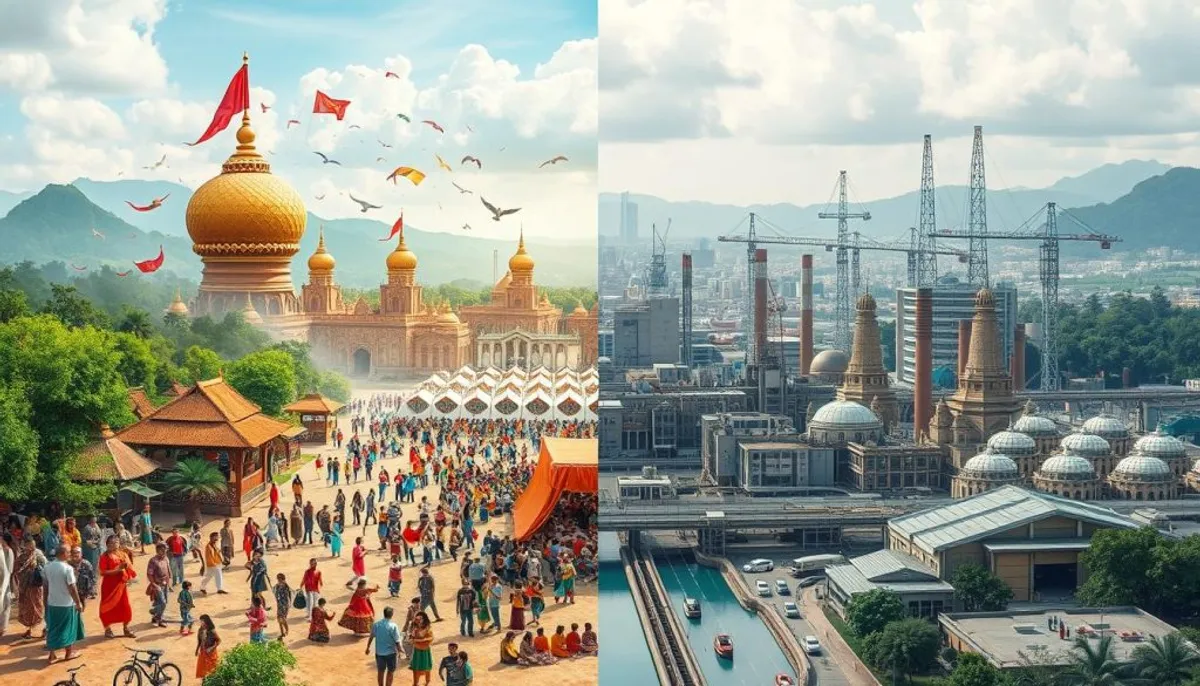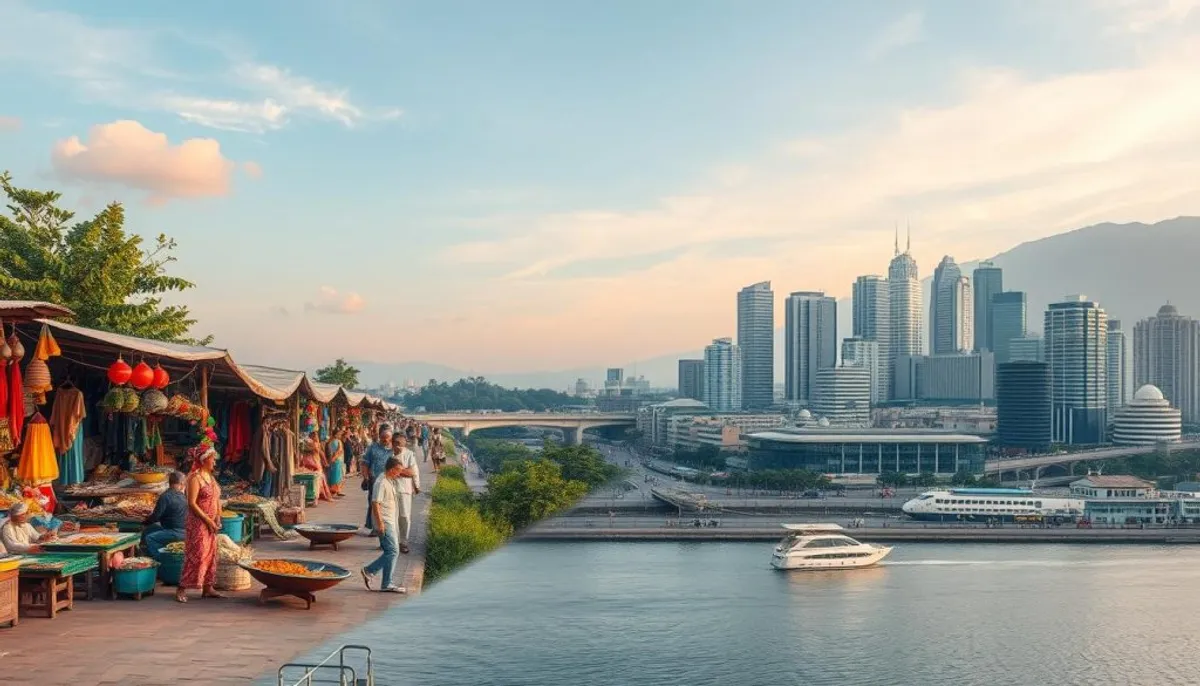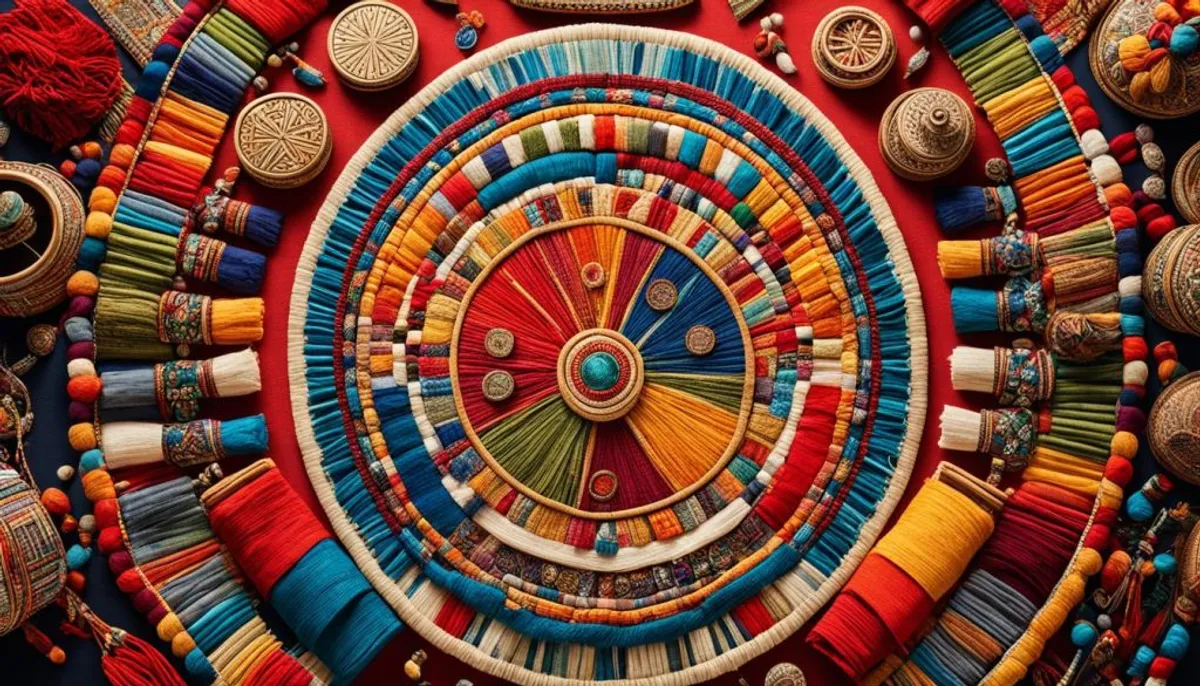The comparison between culture and civilization is essential for understanding the world. Although linked, these two concepts have crucial nuances. Culture is defined by the unique characteristics of a society. In contrast, civilization encompasses a broader and deeper heritage.
The cultural differences profoundly influence our modern society. They manifest in our arts, traditions, and ways of life. The cultural heritage, passed down from generation to generation, is fundamental to the formation of our collective identity.

In a globalized world, the coexistence of diverse cultures is both enriching and complex. Understanding these differences allows us to better navigate our complex society. It also helps us appreciate the richness of human diversity.
Origins and Fundamental Definitions
The study of the etymology of culture and the origin of civilization immerses us in the deep roots of these concepts. These terms, so often used, have a rich history that illuminates their current meaning.
Etymology of the term “culture”
The word “culture” comes from the Latin “colere.” This verb meant to inhabit, cultivate, or honor. This origin reveals the complexity of the concept, encompassing the action on the environment and spiritual practices.
Roots of the word “civilization”
The term “civilization” comes from the Latin “civitas,” meaning city. This origin highlights the collective and organized dimension of the concept. It evokes a structured society, with its rules and institutions.
Historical Evolution of Concepts
The evolution of cultural concepts has refined over the centuries. In the 18th century, people distinguished between “civilized” peoples and others. The 19th century saw the emergence of new approaches, notably in Germany with Herder, who broadened the notion of culture.
Herder included language, literature, and everyday life in culture. English anthropology adopted the term “culture” around 1870, thanks to the work of Tylor. This approach allowed for the study of societies in their entirety, taking into account all aspects of social life.
| Period | Conceptual Development | Impact |
|---|---|---|
| 18th century | Distinction between “civilized” peoples and others | Hierarchization of societies |
| 19th century | Expansion of the concept of culture by Herder | Inclusion of language and everyday life |
| 1870 | Adoption of the term “culture” by English anthropology | Global study of societies |
This evolution of concepts laid the groundwork for our modern understanding of culture and civilization. It paved the way for a more inclusive and nuanced approach to human societies.
The Comparison between Culture and Civilization
The distinction between culture and civilization sparks exciting debates. These two concepts, while linked, present important nuances. They have distinct meanings and scopes.
Material versus Spiritual Aspects
The material aspects of culture are distinct from the spirituality of civilization. Culture includes artistic expressions, languages, and gastronomy. Civilization, on the other hand, focuses on social development, institutions, and collective organization.

Individual and Collective Dimension
Culture is more personal, linked to individual intelligence. Civilization, however, is embodied on the scale of an entire people. This difference is reflected in philosophical and anthropological approaches.
Transmission and Heritage of Values
Cultural heritage plays a central role in both concepts. Culture transmits knowledge, skills, and traditions. Civilization, for its part, perpetuates systems of values and ways of life on a large scale.
| Aspect | Culture | Civilization |
|---|---|---|
| Dimension | Individual | Collective |
| Key Elements | Art, language, traditions | Institutions, social organization |
| Transmission | Skills, education | Value systems, ways of life |
This comparison highlights the richness and complexity of the interactions between culture and civilization. It underscores the importance of understanding these concepts. This understanding allows for a better grasp of the social and individual dynamics that shape our world.
The Impact of Cultural Differences on Modern Societies
Cultural diversity profoundly transforms our societies, especially in the era of globalization. Cultural contrasts shape our interactions, perceptions, and ways of life. This complexity has given rise to cultural geography, a discipline that explores these variations.
In the 19th century, the study of culture expanded to encompass everyday life. Since 1870, the term “culture” has established itself in English scientific research. Geographical works captivated readers with detailed descriptions of the customs of exotic peoples, reflecting the growing interest in cultural diversity.

The Berkeley School introduced an innovative approach by mapping cultural areas. This method allows for tracking the diffusion of innovations and interactions between cultures. Pierre Gourou added an additional dimension by highlighting the importance of social framing techniques in his studies in Tonkin.
The clash of cultures, induced by globalization, can provoke tensions but also opportunities for mutual enrichment. Understanding and appreciating cultural differences is essential for navigating this complex landscape. This understanding fosters intercultural dialogue and the building of bridges between diverse communities.
| Aspect | Impact on Modern Societies |
|---|---|
| Communication | Adaptation of communication styles |
| Education | Integration of multicultural perspectives |
| Businesses | Strategies adapted to international markets |
| Politics | Cultural diplomacy and international cooperation |
Contemporary Manifestations of Culture and Civilization
In our modern world, culture and civilization express themselves in varied and fascinating ways. Contemporary art, cultural traditions, and modern lifestyles intertwine to create a rich and diverse cultural landscape.
Artistic and Intellectual Expressions
Contemporary art reflects the concerns and aspirations of our time. It questions established norms and explores new forms of expression. Artists use innovative media to address current themes such as ecology, identity, and technology.
Belief Systems and Traditions
Cultural traditions persist and evolve in our modern society. They manifest in festivals, rituals, and customs that continue to shape our collective identity. At the same time, there is a resurgence of religious beliefs in response to Western secularization. Additionally, community cultural spaces play a crucial role in preserving and promoting these traditions.
Social Organization and Lifestyles
Modern lifestyles are marked by diversity and innovation. Urbanization, technology, and globalization are transforming the ways we live, work, and interact. These changes influence social organization, creating new forms of communities and relationships.
| Aspect | Contemporary Manifestation |
|---|---|
| Art | Digital installations, interactive performances |
| Traditions | Multicultural festivals, fusion cuisine |
| Lifestyle | Remote work, intergenerational cohabitation |
Conclusion
The synthesis of culture and civilization reveals a captivating evolution of concepts over time. The opposition between civilization and barbarism, dominant in the 19th century, has given way to a recognition of diverse civilizations. Each has its particularities, offering a more nuanced perspective. This evolution opens promising future perspectives for the study of human societies.
Fernand Braudel's approach, emphasizing cultural continuities and intercivilizational exchanges, provides a valuable framework. It teaches us that civilizations, while each having their specificity, enrich one another. This phenomenon is essential in our globalized world.
The distinction between culture and civilization remains a relevant tool for grasping the complexity of our societies. Contemporary methods, combining geography, history, and anthropology, promise a deeper understanding. As we move toward the future, the study of cultures and civilizations will continue to evolve. It will adapt to the challenges of our time while preserving cultural diversity.
RelatedRelated articles


